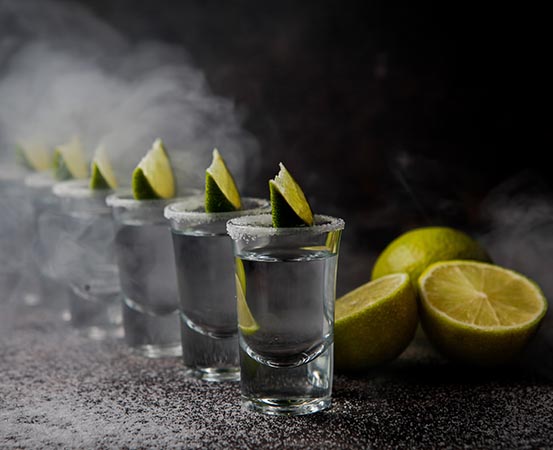
“Occasional social drinking does not affect my health,” was 34-year-old Bharath Reddy’s common excuse for binge drinking. But after he was hospitalised because of severe alcohol poisoning in November 2021, he decided to quit drinking. It was tough to fight the urge, he admits.
Reddy, a techie from Bengaluru, recalls that before the pandemic he used to binge drink once or twice a month. He used to mix drinks and he has had episodes of alcohol poisoning. But those never led him to hospitalisation. “Alcohol poisoning was not something new to me but a year ago, I faced the worst. The doctors informed me that I could have succumbed [to alcohol poisoning]. I only remember throwing up and then blacking out,” he says.
According to the US Centers for Disease Control and Prevention (CDC), alcohol poisoning is caused by drinking large quantities of alcohol in a short period. On average, six people die every day from alcohol poisoning in the US. Alcohol poisoning deaths affect people of all ages but are most common among middle-aged adults and men.
Very high levels of alcohol in the body can shut down the critical areas of the brain that control breathing, heart rate and body temperature, resulting in death, states the CDC.
What is binge drinking?
Dr Mathew Jacob, senior consultant, hepato-pancreato-biliary and abdominal multi-organ transplant, Aster Medcity, Kochi, says that in men, five or more drinks at one time and in women, four or more drinks at one time is considered binge drinking.
What are the parameters?
There is no set parameter for how much alcohol is too much as it differs from person to person, says Dr Pravin Agrawal, consultant, liver transplant and hepato-pancreato-biliary surgery, Jaslok Hospital, Mumbai. “Each person has a different capacity to metabolise alcohol and it also depends on the history of alcohol consumption. A person drinking for the first time may have less capacity to metabolise alcohol compared to those who have been drinking for years,” he tells Happiest Health.
Dr Agarwal says that overall, drinking should be avoided as drinking occasionally could turn into binge drinking through which people develop addiction and dependency.
Long-term, short-term effects of binge drinking
The short-term effect of binge drinking is acute alcohol poisoning, which can cause liver damage. People could develop acute alcoholic hepatitis which can cause liver failure (coma, lack of blood clotting and other organ failures). Acute alcohol poisoning can also affect critical areas of the brain that controls vital functions like breathing, blood pressure and temperature resulting in death, says Dr Jacob.
“In the long-term, liver damage can progress to cirrhosis, liver failure with jaundice, fluid overload and can also cause liver cancer,” says Dr Jacob.
“Binge drinking is common during celebrations and weekends. It is important to remember that most binge drinkers are not alcohol dependent. However, they still need counselling,” he cautions.
How does binge drinking affect your overall health?
According to Dr Agrawal, binge drinking affects all the organs of the body. “It will slow down cognitive function and one may experience convulsions or epilepsy which can suddenly increase. It can also lead to gastritis, bleeding from the mouth and vomiting. They may develop acute pancreatitis which can be life-threatening. It affects the liver, causing alcohol hepatitis,” he says.
Dr Jacob says binge drinking could result in chronic health issues such as hypertension, heart disease, stroke, liver disease, cancers and memory and learning problems.
Dr Pallavi Joshi, consultant psychiatrist, Manipal hospital, Bengaluru, says that binge drinking affects both the mind and the body. “With fluctuations of blood sugar and blood pressure levels, people can resort to violent behaviour and get involved in assaults and accidents,” she says.
How do I know if I am a binge drinker?
According to Dr Joshi, people who binge drink have no control over drinking despite their minds asking them to stop. When they have no control, they are at risk of addiction.
Dr Joshi lists out a few signs to identify binge drinkers who are closer to becoming addicts:
- Increased tolerance and not getting the same amount of satisfaction or happiness after consuming alcohol of the same quantity
- The need to increase the amount of spirit in the drink
- Withdrawal symptoms such as restlessness, sleeplessness, palpitations and tremors when limiting alcohol intake
Seek help and get treated
Reddy recalls that it was difficult for him to quit drinking and he experienced withdrawal symptoms. “I would toss around in bed as I couldn’t fall asleep and felt restless. My friends suggested counselling sessions for de-addiction. It was not easy to accept that I had become an addict, but I managed to overcome it after a few sessions,” he says.
Dr Joshi says that other than prescribing medicines to reduce the binging pattern, psychotherapy also helps. “We ask people to relate alcohol with something that they dislike so as to feel disgusted and overcome the urge. If the person has a tendency of unpredictable behaviour after drinking or doing extreme activities, we ask them to indulge in positive addictions like painting and exercising,” she says.
Takeaways
- Effects of binge drinking can be immediate, or it can take years and result in chronic liver damage and cancers.
- Alcohol will have adverse effects during pregnancy and on people with comorbidities.
- Avoid drinks with unknown alcohol content or mixing alcohol with energy drinks. Caffeine can mask alcohol’s effects and lead to overconsumption.

















